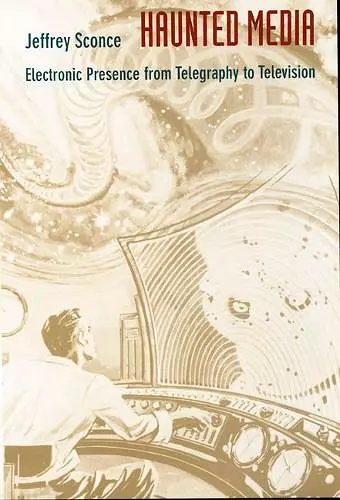Haunted Media
Electronic Presence from Telegraphy to Television
Format:Paperback
Publisher:Duke University Press
Should be back in stock very soon

This book explores the ongoing connection between new electronic media and spiritual phenomena, tracing historical developments from the telegraph to television, while examining cultural responses and anxieties surrounding technology. Haunted Media offers insights into telecommunications' impact on society.
In Haunted Media, Jeffrey Sconce explores the enduring connection between new electronic media and paranormal phenomena throughout American culture, tracing this relationship from the invention of the telegraph to the rise of television and computers. Through a historical lens, Sconce analyzes how communication technologies have influenced societal discourses on modernity and metaphysical concerns. He illustrates how perceptions of electronic presence have evolved over time, shifting from a curiosity about the limits of space and time to a growing unease regarding the dominance of technology in everyday life.
Sconce highlights five pivotal moments in the evolution of telecommunication, starting in the mid-nineteenth century. He examines the impact of telegraphy, the emergence of wireless communication, the transformation of radio into network broadcasting, the introduction of television, and contemporary discussions surrounding computers and virtual reality. Each technological advancement is contextualized within the cultural anxieties and spiritual responses it elicited, such as the rise of spiritualism in reaction to telegraphy and the perception of radio as a medium connecting individuals to an afterlife.
The book also delves into the cultural implications of early television programming, noting how series like The Twilight Zone and The Outer Limits contributed to a growing sense of paranoia surrounding electronic media. Sconce concludes by addressing the emergence of postmodern media criticism, framing it as a contemporary manifestation of the mythologies surrounding electronic presence. Haunted Media serves as an engaging cultural history that appeals to a diverse audience, including students and scholars interested in media, American studies, and cultural theory.
“Death, desire and distance are Jeffrey Sconce's companions in this truly spooky journey through the ‘troubling afterlife of modernity.’ His brilliant and beautifully written history of the uncanny powers ascribed to the electronic media is a wonderful catalogue of popular fantasies. But more profoundly it is a symptomatology of media theory too. In fact and fiction alike we are caught up in wild imaginings that seek transcendance in transmission, from the ether to the Internet. Where redemption is sought from the ‘liveness’ of technology, Sconce advises caution. Or, as one of the quirky spirits he unearths implores via radio, ‘bring a halibut!’ ”-John Hartley, Queensland University of Technology “Sconce offers an original and productive examination of the diverse social responses to 150 years of electronic communication. The result is an important and evocative book, notable for both its insights and its engaging style.”-William Boddy, author of Fifties Television: The Industry and Its Critics “This is a powerful, compelling, and historically informed analysis of popular representations of electronic presence. Sconce has a rare ability to write about complex cultural phenomena in a poetic fashion, offering the reader a fascinating counterpart to existing scholarship in this area.”-Michael Curtin, author of Redeeming the Wasteland: Television Documentary and Cold War Politics
ISBN: 9780822325727
Dimensions: unknown
Weight: 476g
272 pages